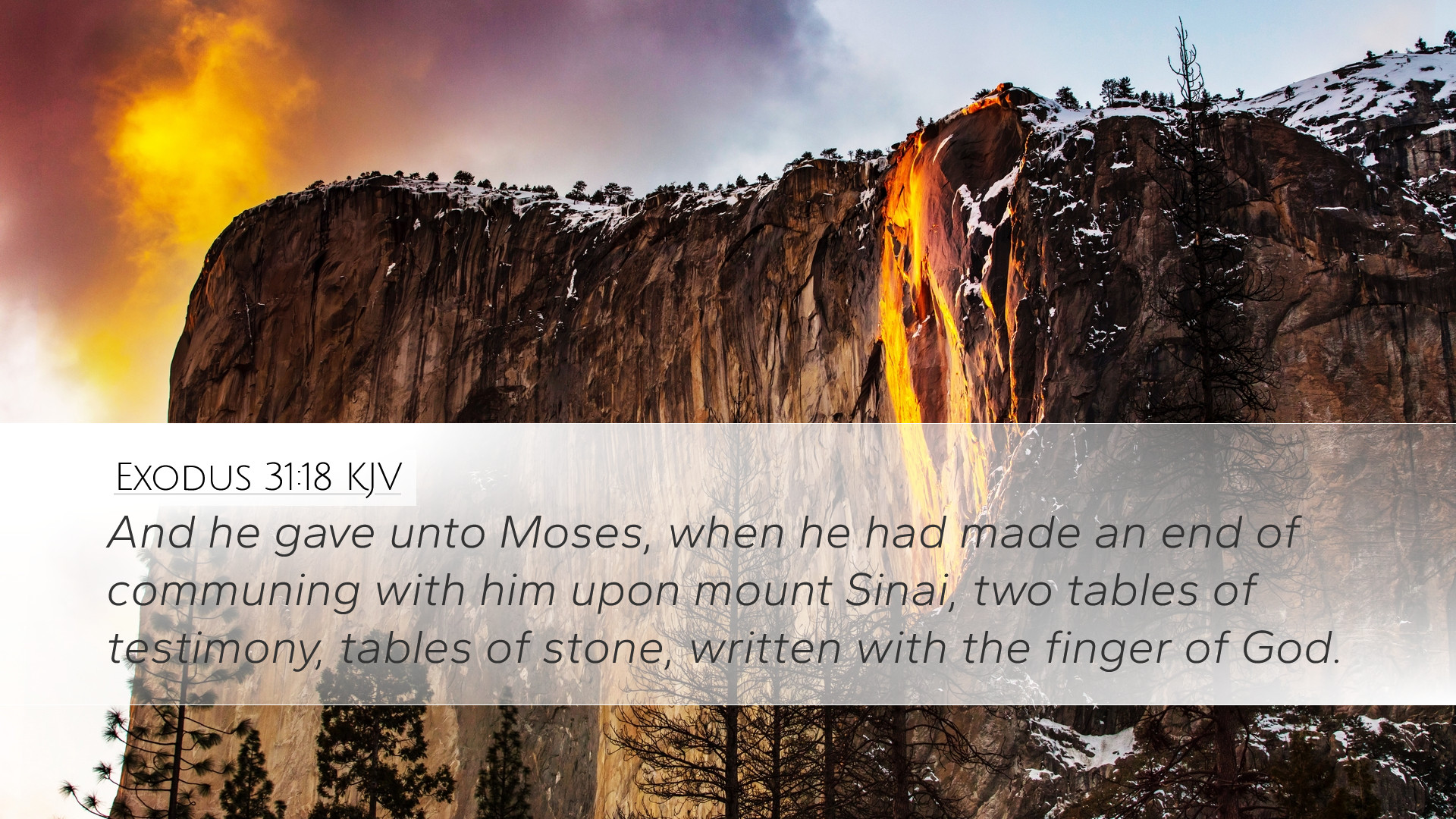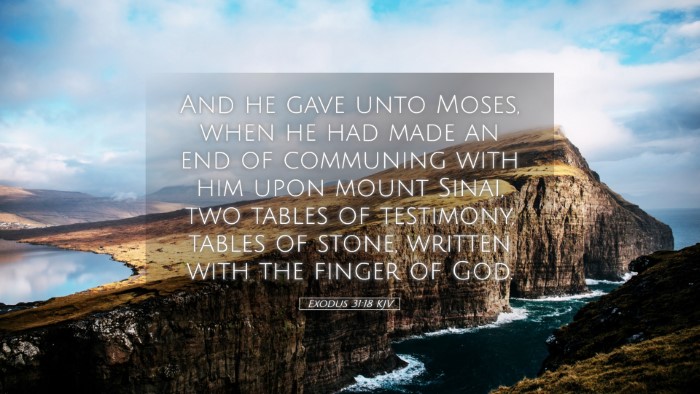Commentary on Exodus 31:18
Exodus 31:18 states: “And He gave unto Moses, when He had made an end of communing with him upon mount Sinai, two tables of testimony, tables of stone, written with the finger of God.” This verse concludes a profound segment of God's dialogue with Moses, highlighting the significance of the divine laws that were inscribed on the tablets. Insights drawn from multiple public domain commentaries shed light on the theological, historical, and practical implications of this momentous event.
Divine Revelation and Authority
Both Matthew Henry and Albert Barnes emphasize that the giving of the tablets signifies God's direct communication and the conveyance of His authority to Moses. The term "tablets of testimony" suggests that these laws serve as perpetual witnesses against sinful actions and reveal the nature of God’s covenant with His people.
- Matthew Henry notes that the tablets were not merely physical objects but served as enduring symbols of God’s covenant and the moral and spiritual obligations placed upon His people.
- Albert Barnes elaborates on the idea that the inscriptions occurred "with the finger of God," indicating a divine origin that sets these commandments apart from human laws. This phrase underscores that the law's authority stems directly from God Himself.
The Symbolism of Stone Tablets
In the ancient Near Eastern context, stone tablets were often associated with the preservation of law. Adam Clarke points out that the permanence of stone represents the unchangeable nature of God’s commandments. This stability is critical in a world where human beings and their laws often change. Clarke suggests that God’s intentions for His people are eternally relevant, thereby reinforcing the sacredness of the moral code.
The Role of Moses as Mediator
Moses occupies a pivotal role here. Not only does he receive the law, but he also acts as a mediator between God and the Israelites. Matthew Henry depicts Moses as a type of Christ, foreshadowing the ultimate mediator who would come. Just as Moses ascended the mountain to commune with God and give the law, Christ ascended to the Father, providing a new covenant written not on stone but on hearts.
Instruction for Worship and Conduct
The law given to Moses encompasses more than mere regulations; it encapsulates principles for worship and ethical conduct. Albert Barnes asserts that the law’s instructions reflect God’s holiness and the moral order that His people are to follow. The civil, ceremonial, and moral aspects of the law echo throughout many parts of Scripture, demonstrating that God’s expectations of holiness and righteousness remain paramount for His followers.
The Finger of God: A Theological Insight
The phrase "written with the finger of God" carries profound theological implications. Adam Clarke interprets this as a testament to the divine inspiration and infallibility of the commandments. This phrase invokes the imagery of divine craftsmanship, suggesting that just as a sculptor etches his work, God intimately inscribes His desires and commandments into the foundations of human life.
Application for Believers
This passage serves as a crucial point of reflection for both clergy and laypeople. The enduring nature of God’s commandments invites believers to evaluate their lives against these divine truths. Matthew Henry reminds us that the law is not a means of salvation but a guide that reveals God’s character and leads us toward sanctification.
- Albert Barnes urges believers to approach these commandments as foundational principles that govern interactions with God and fellow human beings, encapsulating love, justice, and mercy.
- Adam Clarke emphasizes the importance of internalizing the law in our hearts, as the ultimate fulfillment of God’s commandments is found in Christ, who enables believers to uphold this moral order through the grace afforded by the New Covenant.
Conclusion
Exodus 31:18 encapsulates a moment of divine revelation that is rich in meaning and significance. By understanding the context and the implications of the tablets given to Moses—inscribed by the finger of God—believers are called to reflect on their covenant relationship with God, the moral order established by His commands, and the enduring relevance of His teachings throughout history. With a rich tradition of commentary reflecting on these themes, pastors, students, theologians, and scholars are encouraged to engage deeply with this passage as they seek to understand the insights it holds for their faith and practice.


